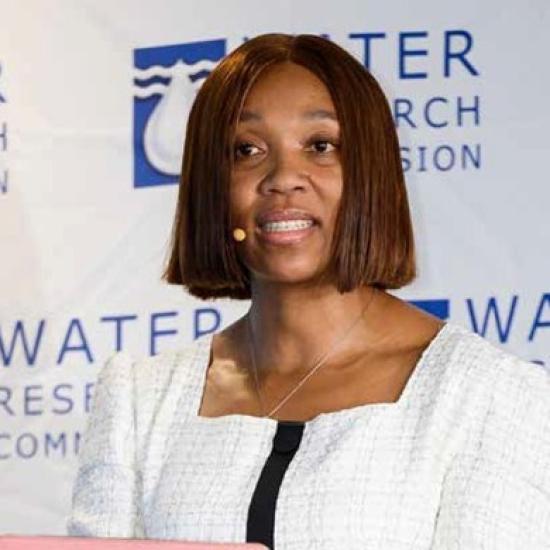A call for skills over cement as
infrastructure and climate resilience crumbles

South Africa is building for a world that no longer exists. Drainage systems cannot handle the influx of rain. Dam storage capacities cannot hold all the water due to sedimentation. Roads and bridges fall apart within years. The country’s infrastructure is collapsing because the skills behind it have not changed.
“We need infrastructure that is able to adapt, that can mitigate the impact of climate change. Our current urban drainage systems are not adequately able to do that,” said Water Research Commission (WRC), Senior Project Manager Lesego Gaegane.
Gaegane said many engineers, artisans and planners are trained in systems that do not match what is needed on the ground. They need to be reskilled and upskilled on incorporating climate resilience in their work.
“Although the country may have had heavy rainfalls, we are not able to store as much water as we can because the dams are not at their full capacity due to sedimentation. I am managing a programme on dam siltation management – sedimentation builds up due to poor land use amongst other factors and reduces how much water dams can store. And as a country, we have not had an optimal approach to this.”
The problem is not just technical. It is about systematic planning for the long haul.
“When we build infrastructure, not enough thought is given to what happens afterwards. That is why we see new buildings falling apart in five years, unfortunately there is no proper plan to maintain them,” she added.
Skills transfer
The answer is not new policies. It is practical skills.
“If you are building a dam or a power plant, skills development must be included in these contracts, bring in young engineers. There must be a skills transfer. You cannot just build and walk away. You have to pass on the knowledge. If we do not integrate skills development into project delivery, we risk building infrastructure that fails prematurely due to poor maintenance or lack of operational expertise. This leads to higher costs, service disruptions, and even reputational damage. That is how we build sustainability,” explained Gaegane.
The country needs occupational training that fits the work for each specific sub-sector.
Water and energy systems are inseparably linked. Water is essential for energy production, particularly in hydropower and cooling systems, while energy is critical for every stage of the water cycle, from abstraction and treatment to distribution and reuse. To ensure sustainability, efficiency and long-term economic value, South Africa must cultivate cross-sector competencies that reflect this interdependence.
For example, energy auditing within water utilities helps reduce operational costs, while understanding water footprints in energy production supports more efficient resource use. These skill sets must be embedded across engineering, planning and operations curricula. Building expertise at this intersection is not only important – it is urgent.
"That is how you make sure the current workforce is equipped and that the next generation is ready.” This is not optional.
Skills development is not a nice-to-have. It is what stands between us and collapse. You cannot have infrastructure without skills. And you cannot have resilience without both.
Embedding skills development in the fine print
Speaking at the recent DEVAC Infrastructure Summit held in Johannesburg, Gaegane called for developments to be planned in tandem, with training requirements integrated directly into infrastructure contracts while driving and championing local innovations.
“TVET colleges must be central to this effort, recognising that Africa’s infrastructure future relies not solely on the expertise of engineers and scientists, but also on the competence of technicians and artisans,” she said.
Innovative solutions
The WRC’s projects modelled on these principles have proven to be a success.
“Among these is the Giyani Local Climate Resilience Programme. By deploying solar-powered boreholes in the region, we simultaneously invested in training local communities in the management of both water and energy infrastructure. This dual-skilling approach has demonstrably improved operational reliability, reduced costs, and generated sustainable employment opportunities at the local level,” said Gaegane.
Under Gaegane’s leadership, the National Siltation Management Programme (NatSilt) has pioneered the first occupational-based skills programmes in South Africa, focusing on dam siltation, ecological restoration and catchment rehabilitation.
These training programmes have been developed with a recognition of prior learning framework for experienced individuals with no formal qualifications and have secured accreditation from the Quality Council for Trades and Occupations. The WRC has partnered with the University of Johannesburg to mainstream Dam Siltation Management short learning programmes for sector-wide upskilling.
“We must champion local innovation, recognising that African solutions, rooted in local knowledge, will yield the most resilient outcomes. But importantly, we must not overlook the vital role of ecological infrastructure – our natural buffers are essential complements to engineered systems,” said Gaegane.
The summit's broader discussions echoed the sentiment that Africa’s infrastructure must be both climate-resilient and people-resilient.
KwaZulu-Natal MEC for Public Works and Infrastructure, Martin Meyer, stressed the continental significance of regional infrastructure, stating, “If KwaZulu-Natal ports fail, South Africa and Africa fail.”
Deputy Minister of Electricity and Energy Samantha Graham-Mare advocated for policy reforms that champion localisation. Namibia’s Minister of Works and Transport, Veikko Nekundi emphasised the critical need for genuine cross-border collaboration.
“Our collective challenge and indeed our profound opportunity lies in transforming the continent’s infrastructure pipeline into a dynamic platform for skills, innovation and inclusivity. It is essential that the people of Africa, particularly women, youth and rural communities, are placed firmly at the heart of this transformative journey,” concluded Gaegane.


